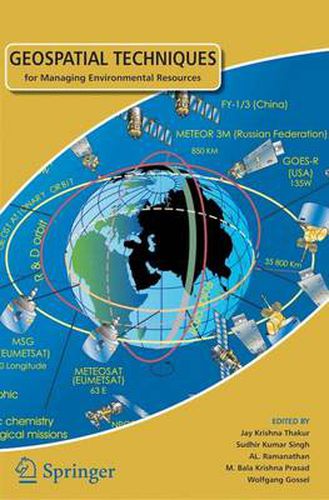Readings Newsletter
Become a Readings Member to make your shopping experience even easier.
Sign in or sign up for free!
You’re not far away from qualifying for FREE standard shipping within Australia
You’ve qualified for FREE standard shipping within Australia
The cart is loading…






Geospatial Information is spatial data concerning a place or, in space, collected in real time. Geospatial techniques together with remote sensing, geographic information science, Global Positioning System (GPS), cartography, geovisualization, and spatial statistics are being used to capture, store, manipulate and analyze to understand complex situations to solve mysteries of the universe. These techniques have been applied in various fields such as meteorology, forestry, environmental management, agriculture, health, homeland security etc. around the globe. This volume presents case studies and examples from various parts of the world and provides a broad overview of various approaches; data sets; data acquiring, monitoring and dissemination methods; satellites and sensors; tools and techniques used; integrating tools, techniques and application to various fields for the sustainable management of environmental resources in the context of global environmental change and natural hazards. The objective of this book is to provide state-of-the-art information to academics, researchers and industry practitioners who are involved or interested in the study, use, design and development of advanced and emerging geospatial technologies around the world with ultimate aim to empower individuals and organizations in building competencies for exploiting the opportunities of the knowledge society. All the chapters are peer-reviewes and evaluated and are an inter- and multi-disciplinary source of information, making an effort to link various geospatial techniques to make the earth an habitable place. The contributors have tried to focus their respective views on the current problems that need urgent attention. Consequently, we see this book as a comprehensive information base, which includes work of expertise in their specific fields of research.
$9.00 standard shipping within Australia
FREE standard shipping within Australia for orders over $100.00
Express & International shipping calculated at checkout
Geospatial Information is spatial data concerning a place or, in space, collected in real time. Geospatial techniques together with remote sensing, geographic information science, Global Positioning System (GPS), cartography, geovisualization, and spatial statistics are being used to capture, store, manipulate and analyze to understand complex situations to solve mysteries of the universe. These techniques have been applied in various fields such as meteorology, forestry, environmental management, agriculture, health, homeland security etc. around the globe. This volume presents case studies and examples from various parts of the world and provides a broad overview of various approaches; data sets; data acquiring, monitoring and dissemination methods; satellites and sensors; tools and techniques used; integrating tools, techniques and application to various fields for the sustainable management of environmental resources in the context of global environmental change and natural hazards. The objective of this book is to provide state-of-the-art information to academics, researchers and industry practitioners who are involved or interested in the study, use, design and development of advanced and emerging geospatial technologies around the world with ultimate aim to empower individuals and organizations in building competencies for exploiting the opportunities of the knowledge society. All the chapters are peer-reviewes and evaluated and are an inter- and multi-disciplinary source of information, making an effort to link various geospatial techniques to make the earth an habitable place. The contributors have tried to focus their respective views on the current problems that need urgent attention. Consequently, we see this book as a comprehensive information base, which includes work of expertise in their specific fields of research.